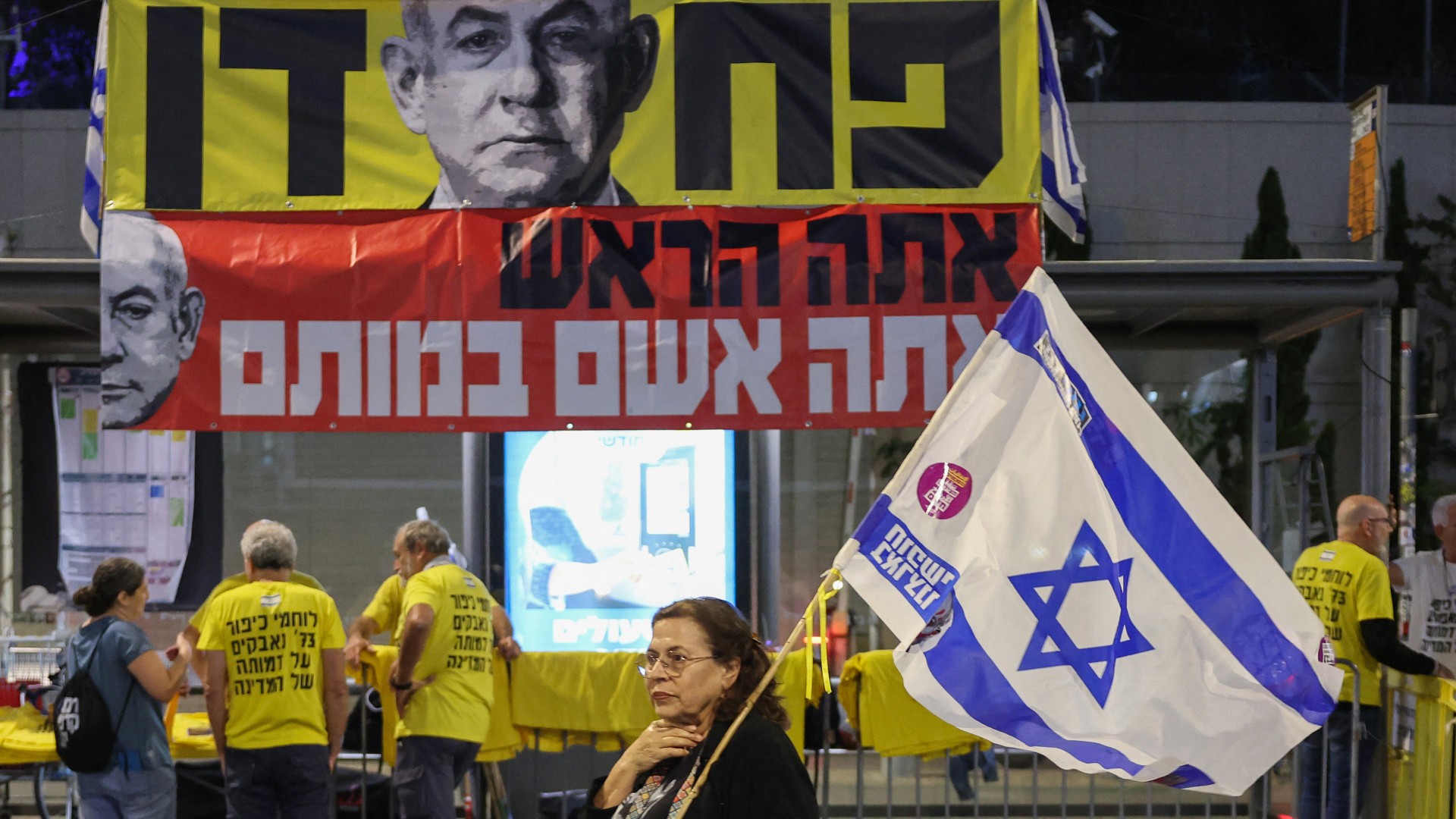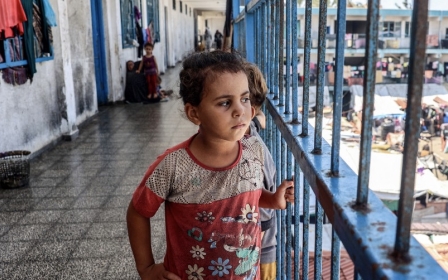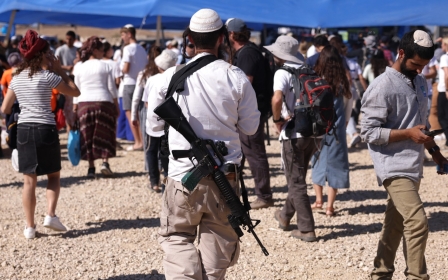After mounting political losses, Israeli society may soon face a reckoning

In the background of the ceasefire between Israel and Hezbollah, Prime Minister Benjamin Netanyahu has been facing mounting pressure from an increasingly frustrated Israeli public.
Israelis have begun to recognise the limits of military power, as top government officials seem to compromise on the idea that Israel can force its agenda on the region by brute force.
In October alone, at least 88 Israeli soldiers were killed in Gaza, Lebanon, and within the so-called Green Line - one of the highest death tolls since the genocide began - along with an additional six Israeli civilians.
New MEE newsletter: Jerusalem Dispatch
Sign up to get the latest insights and analysis on Israel-Palestine, alongside Turkey Unpacked and other MEE newsletters
Even if Israel can inflict massive destruction in the Arab region, its war with Hezbollah has reminded it that even non-state military actors can paralyse and shut down a significant portion of the country.
Nearly a million Israeli residents in the north under fire were forced to leave their homes, while colonies in the south were also largely abandoned. Even now, the ceasefire with Hezbollah has failed to restore a sense of security in the north.
For the first time since the start of the Gaza genocide, protests in Tel Aviv not only called for the return of Israeli captives, but also demanded an end to the war
Despite the unwavering support from the world's leading superpower, Israel ultimately failed to dictate the terms of the ceasefire to reflect its "total victory" narrative, where Hezbollah would be disarmed and Lebanon would submit to its demands.
Most importantly, the defence establishment has realised it cannot achieve a military victory over Hezbollah, just as it could not in the past, and even less so now. With no political resolution in sight, it would have led to years of fighting and entanglement in the Lebanese quagmire.
Still, the interest in a ceasefire serves Netanyahu's attempt to quell internal discontent. It comes just days after the International Criminal Court issued arrest warrants against Netanyahu and former Defence Minister Yoav Gallant.
Meanwhile, Hamas announced the death of an Israeli captive in northern Gaza and a missing Israeli rabbi was reportedly killed in Dubai.
A scandal involving the leak of classified materials from the prime minister's office, known in Israel as "Bibileaks", has prompted widespread criticism and an investigation from the country's security establishment.
The ceasefire was also announced amid difficulties in passing laws to legitimise the exemption of certain groups from military service and a prevailing sentiment within Israeli society that Israel has given up on rescuing its hostages.
Follow Middle East Eye's live coverage for all the latest on the Israel-Palestine war
Even as Israeli leaders seek to re-shift focus back to Gaza, the last 14 months have proven that Israel lacks military and intelligence capabilities to recover the captives without a deal with Hamas.
Netanyahu was also unable to achieve his undeclared goal of conquering Gaza at the expense of reaching a "hostage deal".
In light of these events, for the first time since the start of the Gaza genocide, protests in Tel Aviv erupted that not only called for the return of Israeli captives - previously, the popular slogan was "Bring them back and go back [to Gaza]", but also demanded an end to the war.
Sobering reality
Barely two months into the war on Lebanon, the initial euphoria in Israeli society over the war crime strategy of detonating pagers, which led to civilian casualties, has transformed into the sobering reality that Israel is neither a global nor regional superpower.
Despite the siege, starvation, bombardment, and unspeakable destruction in Gaza, Israel has failed to achieve its stated war objectives - neither resolving the "hostage crisis" nor dismantling Hamas.
On Tuesday, the Israeli parliament voted in favour of a ceasefire with Hezbollah, which will remain a military and political force.
Worse still, new military threats are emerging from Yemen, Iraq and Syria.
Furthermore, despite their targeting of Netanyahu and Gallant, the broader implications of the arrest warrants issued by the Hague are being felt on two fronts: first, Israeli generals are beginning to grasp the personal risks posed by international arrest warrants, which could affect their standing with western nations, military collaborations, arms trade, and intelligence sharing.
Unlike Israel's top leaders, these generals may not enjoy the same level of state protection or immunity.
Second, the broader Israeli public is realising the potential repercussions of the nation's international standing, potentially leading to sanctions and boycotts against Israeli individuals and companies.
But perhaps Israel's most enduring challenge remains Gaza.
Israel has extensive experience with direct occupation - in Gaza, the West Bank, and southern Lebanon.
However, unlike the territories it conquered in 1948 when the world tolerated the ethnic cleansing of Palestinians within the Green Line, the dynamics post-1967 have shifted.
Palestinians, alongside neighbouring Arab nations, have since internalised that leaving their homes means permanent displacement and any notion of "temporary" Israeli occupation is illusory.
From these occupied territories emerged grassroots and military resistance movements that exacted a heavy military toll on Israel.
Although Israel has not formally announced plans to adopt the "Generals' Plan" of re-occupying Gaza, the massive infrastructure investments in northern Gaza suggest this could be the war's implicit goal.
The prospect of settlements in Gaza looms large, potentially marking the return of caravans and the first settlement there.
Such developments are leading more and more reservists - many of whom have been fighting for 14 months - to realise that the war may never end. If Gaza is re-occupied, resistance will persist and intensify, requiring continuous military engagement.
This would demand sacrifices far beyond what was promised at the war's outset, including economic livelihoods, educational aspirations, and personal safety - all to serve the objectives of a messianic right-wing agenda pushing Israeli society into an eternal war without political horizons.
Deepening divide
Amid these mounting crises, Netanyahu has chosen to wage war on all fronts, including against Israel's own security establishment.
His attempts to evade accountability and push through apartheid legislation to disenfranchise Arab Knesset members, along with his efforts to undermine the judiciary and exacerbate internal tensions over Israel's national identity, seek to weaken political opposition.
Ultimately, Israeli society will have to reckon with the cost of uncritical obedience and disregard for international law and human life
But they have only deepened the divisions within Israeli society.
For example, Netanyahu's sidelining of Gallant - a former chief of staff from within the military establishment - while promoting his loyal ally, Israel Katz, who lacks military credentials, has drawn sharp criticism.
Katz's recent repeal of administrative detention against Israeli settlers in the West Bank, against the recommendations of Israel's security apparatus, has only heightened fears of escalating extremist settler terrorism in the West Bank.
As these challenges intensify, Netanyahu's actions broadcast a troubling message to Israeli society: their situation is dire, and the media bubble they've been living in is beginning to burst.
While Netanyahu's manipulative reputation is well-known in Israeli political culture, the public nevertheless followed him into the Gaza genocide with the expectation that things would somehow work out. It seems increasingly unlikely that they will.
Ultimately, Israeli society will have to reckon with the cost of uncritical obedience and disregard for international law and human life.
By the time the full scope of Gaza's devastation sinks in, with more than 44,000 Palestinians killed, 70 percent of whom are children and women, it may be too late.
Some Israelis will regret their actions, some will deny, and others will justify them - but the collective consequences of this devastation will endure, and it will all be too late.
The views expressed in this article belong to the author and do not necessarily reflect the editorial policy of Middle East Eye.
Middle East Eye delivers independent and unrivalled coverage and analysis of the Middle East, North Africa and beyond. To learn more about republishing this content and the associated fees, please fill out this form. More about MEE can be found here.






